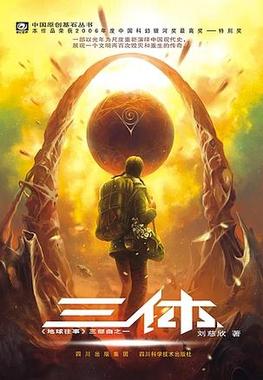
The Three-Body Problem (novel)
The Three-Body Problem (Chinese: 三体; lit. 'three body') is a story by Chinese science fiction author Liu Cixin, the first novel in the Remembrance of Earth's Past trilogy.[1] The series portrays a fictional past, present, and future wherein Earth encounters an alien civilization from a nearby system of three Sun-like stars orbiting one another, a representative example of the three-body problem in orbital mechanics.
This article is about the novel. For the concept in physics, see Three-body problem.Author
三体
2008
China
2014 by
302
- Hugo Award for Best Novel (2015)
- Kurd Laßwitz Award for Best Foreign Work (2017)
三体
三體
"Three Body"
Sān tǐ
Sān tǐ
San1 t'i3
Se thì
Sāam tái
Saam1 tai2
Sam thé
The story was originally serialized in Science Fiction World in 2006 before it was published as a standalone book in 2008.[2] In 2006, it received the Galaxy Award for Chinese science fiction.[3] In 2012, it was described as one of China's most successful full-length novels of the past two decades.[4] The English translation by Ken Liu was published by Tor Books in 2014.[5] That translation was the first novel by an Asian writer to win a Hugo Award for Best Novel;[6][7] it was also nominated for the Nebula Award for Best Novel.[8]
The book has been adapted into other media. In 2015, a Chinese film adaptation of the same name was in production, but it was never released. A Chinese TV series, Three-Body, released in early 2023 to critical success locally. An English language Netflix series adaptation, 3 Body Problem, was released in March 2024.
Background[edit]
Liu Cixin was born in Beijing in June 1963. Before beginning his career as an author, he was a senior engineer working at a power plant in Shanxi province.[9][10] In 1989, he wrote Supernova Era and China 2185, but neither book was published at that time. His first published short story, Whalesong, was published in Science Fiction World in June 1999. The same year, his novel With Her Eyes won the Galaxy Award.[11][12] In 2000, he wrote The Wandering Earth, which also received the Galaxy Award[12] and was adapted into a film in 2019.[13] When the short story Mountain appeared in January 2006, many readers wrote that they hoped Liu would write a novel. He decided to concentrate on novel-length texts rather than short stories. Outside of Remembrance of Earth's Past, Liu's novels include Supernova Era and Ball Lightning. When not otherwise busy, Liu wrote 3000–5000 words a day; each of his books reportedly took about one year to complete.[14]
English translation[edit]
In 2012, Chinese-American science-fiction author Ken Liu and translator Joel Martinsen were commissioned by the China Educational Publications Import and Export Corporation (CEPIEC) to produce an English translation of The Three-Body Problem, with Liu translating the first and last volumes, and Martinsen translating the second.[15] In 2013, it was announced that the series would be published by Tor in the United States[16] and by Head of Zeus in the United Kingdom.[17]
Liu and Martinsen's translations contain footnotes explaining references to Chinese history that may be unfamiliar to international audiences. There are also some changes in the order of the chapters for the first volume. In the translated version, chapters which take place during the Cultural Revolution appear at the beginning of the novel rather than in the middle, as they were serialized in 2006 and appeared in the 2008 novel. According to the author, these chapters were originally intended as the opening, but were moved by his publishers to avoid attracting the attention of government censors.[15]
Inspiration[edit]
In Liu's early childhood, when he was three years old his family moved from the Beijing Coal Design Institute to Yangquan in Shanxi, due to his father changing jobs. He also spent a part of his childhood in the countryside around ancestral hometown of Luoshan, Henan. On 25 April 1970, Dong Fang Hong 1—China's first satellite—was launched. Liu remembered the launch as a pivotal event in his life, recalling a deep sense of longing on witnessing it.[18]
Several years later, Liu found a box of books under his bed in Yangquan, which included an anthology of Tolstoy, Moby-Dick, Journey to the Center of the Earth, and Silent Spring. Upon beginning to read Journey to the Center of the Earth, his father told him: "It's called science fiction, it's a creative writing based on science". This was his first encounter with the genre, and he later remarked: "My persistence stems from the words of my father." At that time, such books could only be safely read privately by individuals: "I felt like being alone on an island, it is a very lonely state".[18][19]
Reverence and fear of the universe is one of the main themes of Liu's writing. According to him, as humans we will stand in awe of the scale and depth of the universe. His novels also focus on curiosity about the unknown. Liu says he cannot help thinking about the future world and lifestyle of human beings, and he tries to invoke readers' curiosity with his books. He also believes that humans should be treated as an entirety.[20]
Liu tried to answer the existential dilemma of "where should mankind go from here" through various efforts.[21]
Analysis[edit]
The book structure has been influenced by self-censorship. The initial draft's opening scenes were seen as "too politically charged" by the publisher, and moved deeper into the book, to avoid attracting criticism by Chinese government censors.[22] Several interpretations of the novels and related film adaptations were presented by Ross Douthat of The New York Times in April 2024.[23]